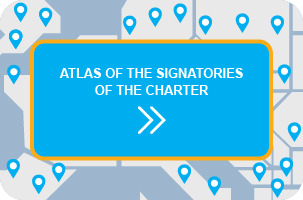City of Berne – interview
City of Berne – Interview 2014/02/19
Interview with Barbara Krattiger – Head of Service of equality between women and men in the hall of Berne
Signature of the Charter: May 2007
Background to the signature of the Charter: The city of Berne has a long tradition of implementing gender equality. Previously, the municipality had been working with equality issues mainly from an employer’s perspective: in 2002 the municipality received the award “Prix Egalité” for outstanding efforts as an equal opportunity employer. In 2006, the municipal council decided to implement local policies to improve gender equality for citizens, and commissioned a working group to reflect upon the elaboration of an action plan. The signature of the Charter in 2007 was a way of reaffirming and strengthening this process, and brought the equality work of the municipality into a broader European context.
Elaboration of the Action Plan: The working group that was established to elaborate the action plan was composed of five persons representing each department of the municipality. The members of the working group were highly qualified administrative staff with an extensive experience in municipal strategies and policies.
The elaboration of the Action plan took two years and was done in two phases;
- 1st phase: Took one year and consisted of defining five main areas and nine objectives for the action plan. The main areas and objectives were based on the European Charter.
Approval of the gender equality strategy: After the first year, the municipal council approved the five areas and nine objectives defined by the working group as a strategy for the work on gender equality of the municipality. The support from the Municipal council was important for the working group to confirm that their work was going in the right direction.
- 2nd phase: Was to prepare specific measures needed to achieve the formulated objectives and then to outline these and draft action plan. This period took ten months. In this phase the working group also established procedures on monitoring and reporting. The action plan was elaborated for a period of 4 years.
The strategy for gender equality was approved by the City council for the period 2008-2015 which meant that a second action plan would be drafted and implemented after the first one.
In line with this decision, the Equality department of Berne started preparing a second action plan in 2011 (when the first action plan had come half-way). A conference with other cities having put in place action plans (Zurich, Berlin, Heidelberg) was organized in order to exchange ideas and good practices.
In summer 2013, the Equality service presented the final report of the first action plan. And it was mandated to establish a working group for drafting a second action plan.
Additional information: The working group that elaborated the action plan did not benefit from external support in the elaboration of the action plan. However, the working group used the European Charter for Equality and the CEDAW-convention on Elimination of all forms of discriminations towards women elaborated by UN as instruments in the elaboration of the action plan.
Length of the action plan: The reason for drafting an action plan for four years is that this is the duration of the mandate for the City Council.
Lessons learned:
- Importance of Political will: commitment and support of the City Council (Parliament), of the Municipal Council and of top administrative management was essential.
- Need for monitoring: The emphasis on monitoring has been crucial for the success in the implementation of the action plan and has contributed to facilitate the implementation of activities.
- Involvement of concerned stakeholders: In the evaluation of the first action plan, it became clear that the most efficient measures were those that closely involved concerned stakeholders. The main resistances in the implementation of the action plan also came from stakeholders that felt insufficiently consulted in the process of the elaboration of the action plan.
- Including external stakeholders: Considering different stakeholders in the elaboration of the action plan is both a challenge in order to adapt the measures according to the needs and the specific situations and a challenge to obtain/get the support from stakeholders.
Added value of the Charter:
- Served as an instrument to educate staff and elected representatives on the concept of gender mainstreaming
- Through the concrete measures that the Charter proposes, especially in the different roles of local and regional authorities (as regulating and decision-making power, as employer and as service provider); the idea of reaching out to women and men through the provision of services for instance was better understood.
- Served as a tool in the elaboration of the action plan providing ideas
- The adoption of the Charter strengthened the political commitment by showing there were synergy possibilities in Europe.
The Equality Service/Department of the City of Berne
Established in: 1996
Number of employees: 3 persons (2,3 FTE)
Mandate:
- To ensure that gender equality is considered in the role as employer of the municipality
- To promote gender equality at local political level and in the services delivered to citizens
The Equality Service is working in a transversal way with the other municipal departments in order to implement the action plan. The Equality service does not have specific expertise but have a coordinating role to mobilize concerned stakeholders and support them in their work and to monitor the implementation of activities.













